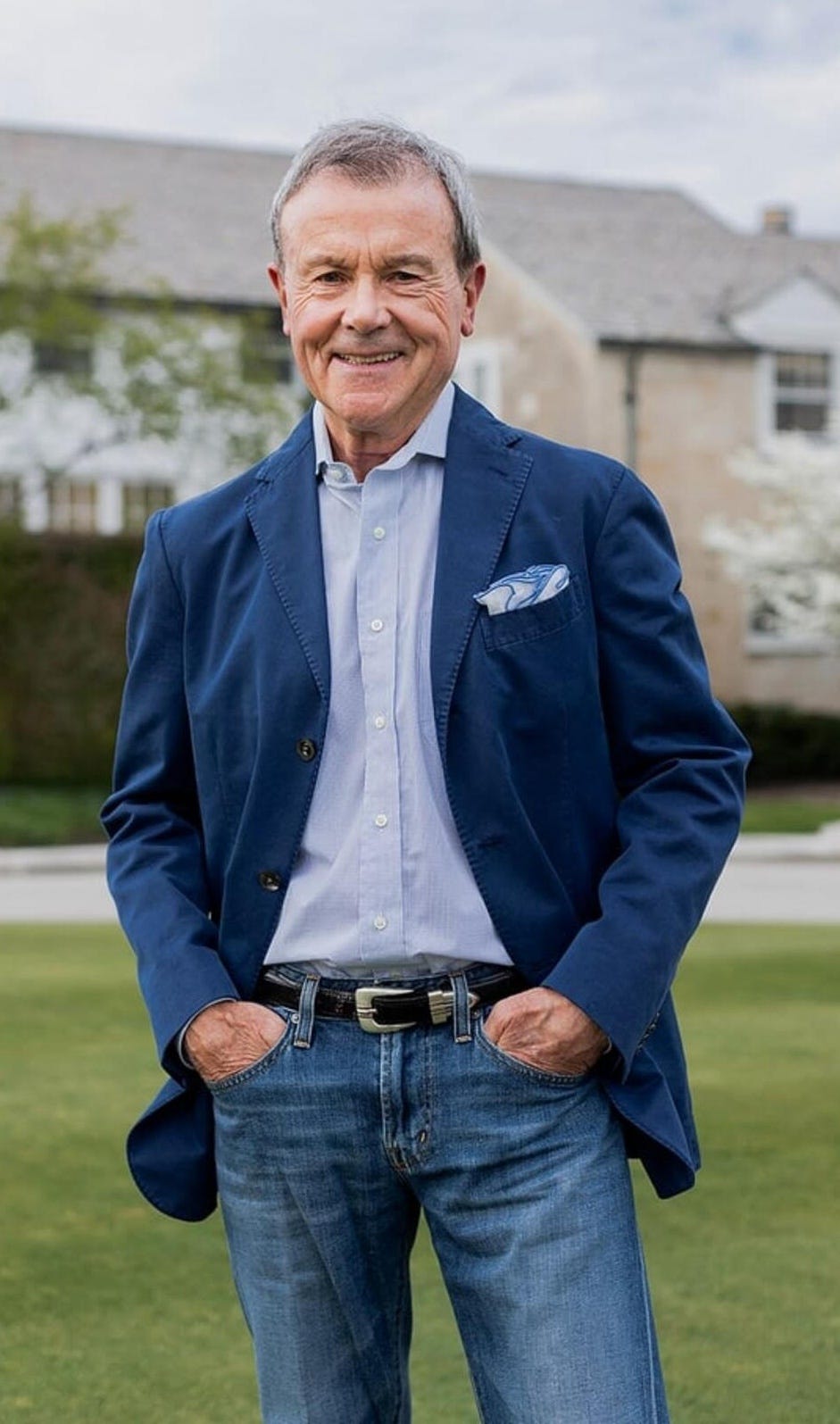Hughes Norton: Golf's ultimate deal maker
In the upcoming book "Rainmaker," the former IMG superagent to the likes of Tiger Woods and Greg Norman provides a riveting tell-all account of the game's biggest players and deals
Believe it or not, Anthony Kim is not 2024’s Most Surprising Return From Exile.
Not even close.
Enter Hughes Norton, who has been on radio silence for 25 years. Surely you remember Norton, the man who put the “super” in superagent.
Well, if you missed the 1980s and ‘90s, Norton worked for International Management Golf (IMG) and was the agent to golfing superstars such as Tiger Woods and Greg Norman. If there was a Golf Agents Hall of Fame, Norton and IMG founder Mark McCormack would be the most significant inductees.
About the surprise: Norton is back with a bang thanks to a new book, “Rainmaker,” co-written with former Golf magazine editor George Peper. It is a juicy, behind-the-curtains tell-all book about his life at the top of professional golf’s food chain. Be warned: Once you pick it up and start reading, Norton’s inside stories (from Greg Norman’s philandering to personally getting Earl Woods on IMG’s payroll while Tiger was an amateur to the surprising figure who may have initiated Norton’s eventual firing by Woods) make it impossible to put down.
Here’s Norton on Norman, for instance: “No client in my experience ever loved making money more than Greg. I sensed the dollars becoming Greg’s way to keep score particularly as his major championship performances kept falling short of expectations. Money validated him.”
Norton scored a lot of such validation for his clients. The list of golfers he signed included Woods, Norman, Tom Watson (temporarily), Nancy Lopez, Curtis Strange, David Duval, Lanny Wadkins, Hal Sutton, Peter Jacobsen and Mark O’Meara. And that’s just for starters. Landing any one of those players would have been a career-maker for most agents. Norton landed all of them, which was why IMG upped his salary to $750,000 plus bonuses in 1997, he revealed in the book, a kingly sum then.
Golf’s two deals of the century were both landed by Norton on behalf of Woods. When Tiger turned pro and opted out of returning to Stanford University — even though he told everyone he was coming back up until the moment he wasn’t — he already had a stunning $40 million deal with Nike and a $20 million deal with Titleist that Norton had set up. Both deals included bonuses for winning majors, which Woods cashed in for many millions more. The figures in those deal were never-before-seen-in-golf-sized figures.
Norton was a big player in golf. Hence his nickname, “Huge,” which originally stemmed from Spaniard Seve Ballesteros’ pronunciation of his first name but later caught on among his co-workers and growing list of jealous enemies in IMG’s Cleveland-based office.
So why is Norton finally breaking his long-held silence after all these years out of the business? He answers that on page one of his author’s note, explaining that there has never been a book about what it’s really like to be a sports agent and that movies such as “Jerry Maguire” and “Air” are Hollywood caricatures.
“No book has captured the blocking and tackling behind the glitz and glamour of managing superstar athletes,” writes Norton, 75, who adds that he also wanted to help chronicle the legacy of sports’ most famous, “some would say infamous,” management firm, IMG.
Norton does a good job at letting us look inside his world. And he does it with enough honesty that we also see his faults, failures and embarrassing mistakes.
“This is not a vanity book … nor is it an exercise in ‘woe is me’ self-pity,” Norton writes. “I’ve tried to keep the narrative real and balanced, have included things I’m proud to have accomplished but also things I’m not proud of.”
— — — — — — —
MORE FROM GARY VAN SICKLE
> Sir Isaac Newton and the quest for distance
> Bill Murray: AT&T Pebble Beach Pro-Am GOAT
> Hey, Mr. Van Sickle, I have a question
> And the winners are ... not who you think
> Tiger plays, we watch. Tiger speaks, we listen
— — — — — — —
The big elephant in the book is why Norton was fired by Woods barely two years after closing the Nike and Titleist deals, and was later terminated by his mentor, McCormack (but with a $9 million buyout over 10 years that included a non-compete clause).
Two things happened. One was a stunningly negative cover story in the now-defunct Golf World magazine about Hughes and how IMG wielded its power. Another was that O’Meara, whom Norton introduced to Tiger years earlier thinking he would be a good mentor for the burgeoning star (and he was), left IMG and then, Norton believes, persuaded Woods to leave, too.
Woods rebuffed Norton’s request for an explanation of his sudden firing and sharply refused to discuss it. When Norton confronted O’Meara, “He denied it in a way that was not credible. Ten years later when I happened to see him again, the subject came up and he became extremely defensive in a way only a guilty man can. If that isn’t betrayal, I don’t know what is.”
Of course, money is how agents keep score so it was in character with the former superagent that he points out his $9 million in severance pay equates to $16.5 million today.
It was a strange ending to the Woods-Norton pairing. Norton was the first agent to meet with Tiger and his parents when Woods was just 13, way before he appeared on the radar of other agents. Tiger was 5-feet-5-inches and weighed 100 pounds at their first meeting, Norton recalled. Upon visiting Woods’ bedroom, Norton was surprised to see no trophies. “He said, ‘By the time I hit 11, there were 113 of them and Mom made me give them all away. I don’t care.’”
Norton also heard the Earl Woods speech that Tiger’s father repeated many times for the media years later about how his son was going to change the world, not just the golf world. In an inspired moment, Norton got IMG to put Earl on a $25,000 retainer, plus expenses, as a junior golf talent scout after clearing it with the USGA, which approved the deal as long as no quid pro quo was involved.
Later in the book, Norton recalled the best recognition he got from Tiger, who rarely commented on his help. “One day he said, ‘Hughesy, you and I make a great team. We’re both number one in the world at what we do.’”
Norton had breakups with the best. Norman was the game’s biggest gate attraction before Woods. Norton recalled how Norman began seeing a 22-year-old Australian model who lived in Hong Kong and asked to borrow Norton’s phone so he wouldn’t leave a phone bill paper trail. Norton regretted it because he was friends with Norman’s wife, Laura, and because Norman rang up thousands of dollars in phone charges “for which I would never be reimbursed,” Norton writes. It was the relationship with that same model that led to Norman’s high-profile marriage to tennis star Chris Evert later dissolving, too.
In 1993, Norman informed Norton and the head of IMG’s Australia office that he was leaving IMG. “Those words hit me like a cannonball,” Norton writes. “I was speechless. The guy who had been not only my number one client but my close friend for more than a decade — the guy for whom I’d produced $50 million of income — had just fired me.”
Norton noted in a later magazine interview that “even Joe Soap from down the street could have made me a lot of money” because Norman was “the hottest property in golf.” Now, Norton writes, Norman’s legacy is selling Wagyu beef and other vintners’ wines. Norton: “Norman saw himself as a brilliant businessman — still does, as evidenced by his LIV role — but there is little evidence to back that up.”
To highlight just how effective Norton was at his job, there is a look into the respective Rolex deals for Phil Mickelson and Woods.
While Woods had Norton in his corner, Mickelson went with his college golf coach as his agent instead of IMG. “At the time, Phil’s Rolex deal was rumored to be $25,000 a year plus some free watches. Tiger got $200,000 his first year, plus another $645,000 in royalties from a Tiger Woods Signature Tudor watch, the first time Rolex paid a royalty to an athlete. Tiger’s only cost was one day per year of his time with Rolex.”
There’s plenty more in this book but the gist of it is, Norton has had more than two decades to reflect on his position in golf, a position at the top of the game, and how it affected his own life. His self-critical analysis makes it clear he isn’t making excuses for his choices, just trying to explain them as he saw them. And, yes, he has some regrets.
“I absolutely loved my job,” he writes. “I was on top of the world, repping the hottest athletes on the planet and reveling in my role as rainmaker. My job had defined me. My workaholism had left me little time for introspection. I’d always thought of myself as humble, self-effacing, appreciative. But the evidence to the contrary was hard to deny … the realization that I had casual acquaintances but few friends, my inability to sustain a serious relationship …
“The same monomaniacal focus that cost me my marriage had cost me my relationship with Tiger and ultimately my job at IMG. I was bitter about betrayal by clients and colleagues but proud of what I had accomplished and at peace with it. In the years since, I have never said, ‘I wish I were back in the golf business.’ Not once.”
“Rainmaker” will serve as his written legacy for Norton’s family and any other interested parties. In an epilogue, Norton examines where golf has gone since he departed — the PGA Tour’s FedEx Cup, oversized purses and, of course, the rival LIV Golf group. He has a warning.
“Professional golf, if it isn’t careful, may well be a victim of its own greed,” he writes.
Like IMG and Norton, in some ways.
Or even Anthony Kim, whose importance never approached that of this Rainmaker.






what's more fun than behind the scenes scoop about tiger and shark and the others? fun and breezy read. it leaves you wanting more "rainmaking." thx for reading--vans
Who doesn't want to read behind the scenes stuff about Tiger and Shark! It's breezy reading,
you will like it. i think mar 26 is official publication date. thx for reading my story!--vans